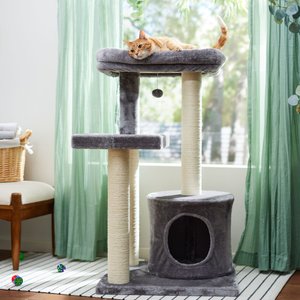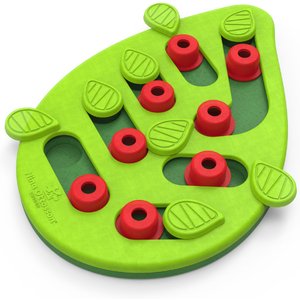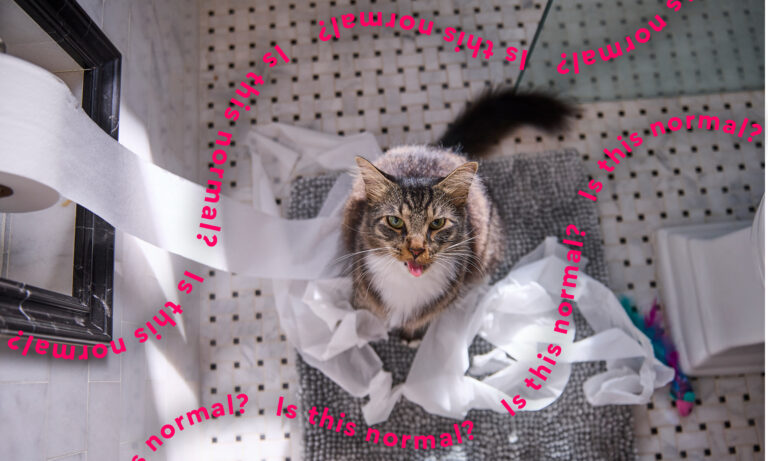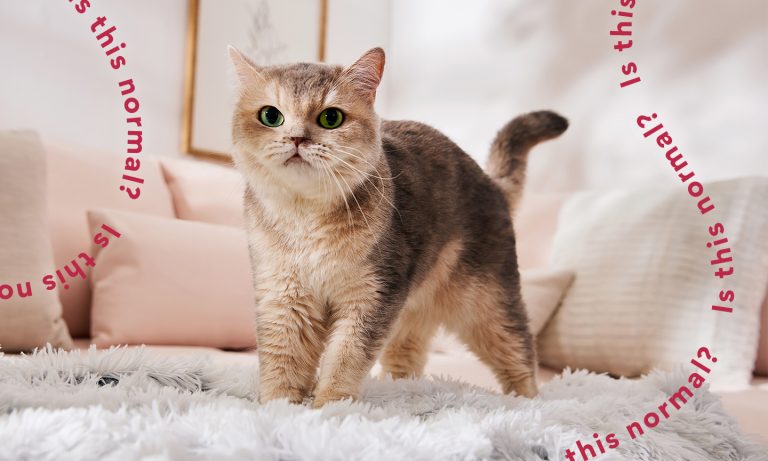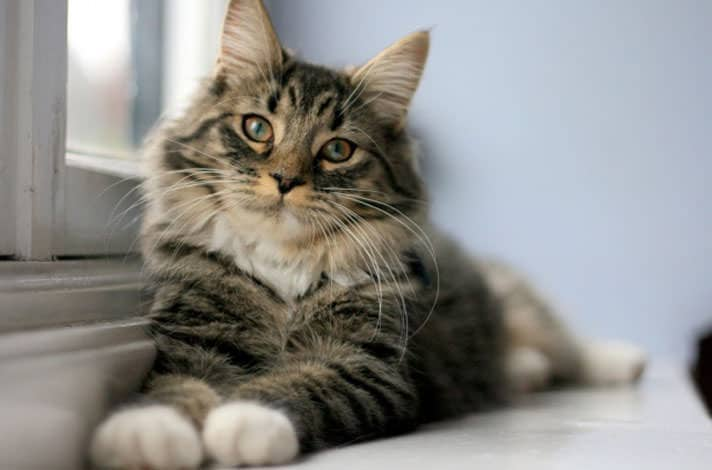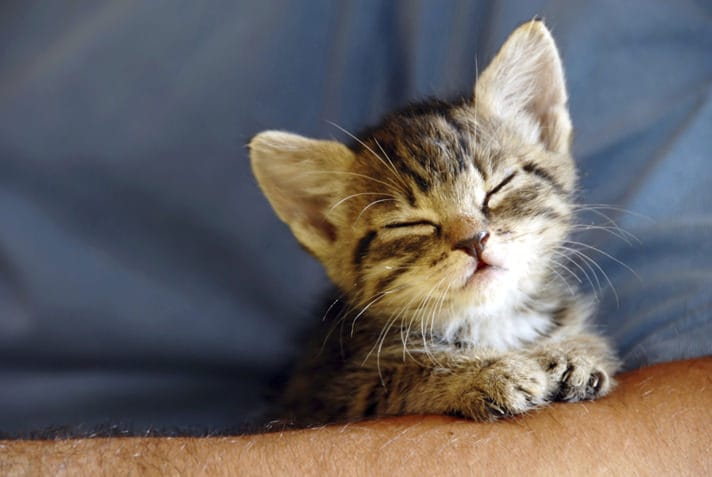In This Guide:
What Is Cat Spray?
Cat spray is a foul-smelling liquid that’s projected onto a vertical surface by a male or female cat. It’s not the same as peeing outside the litter box.
“Cat spray is made of urine, but it is believed that there are subtle chemical differences between urine released as part of normal elimination when squatting (regular peeing) versus cat spraying, also called urine marking,” says Kate Anderson, DVM, DACVB, veterinarian and assistant clinical professor at Cornell University College of Veterinary Medicine in Ithaca, New York.
The telltale sign of urine marking is a cat backing up to an object, standing on all fours with their tail erect and quivering, while liquid is sprayed backward and upward onto their target of choice. This is often a wall, entryway, couch, or other vertical surface.
Why Do Cats Spray?
Almost always, cats spray as a way of marking territory.
“Much like a dog lifting [their] leg, cats mark their territory with this behavior,” says Gavin Casper, DVM, CVA, CVC, managing veterinarian at Hometown Animal Hospital in Weston, Florida. “Urine spraying allows cats to spread their scent onto a specific area.”
He says this behavioral problem often occurs with intact male cats (unneutered males), but that it can also occur when spayed or neutered cats become stressed or anxious.
Potential reasons cats spray urine:
- Territorial marking
- Scent communication
- Anxiety or stress
- Mating behavior
- Conflict in multi-cat households
- Medical issues such as urinary tract infections (UTIs)
- Changes in routine or that cat’s environment, like moving or introducing a new baby to the home
- Litter box issues (location, cleanliness, sharing)
- Aging-related medical causes
How To Stop Cat Spraying
1 Consider Medical Problems
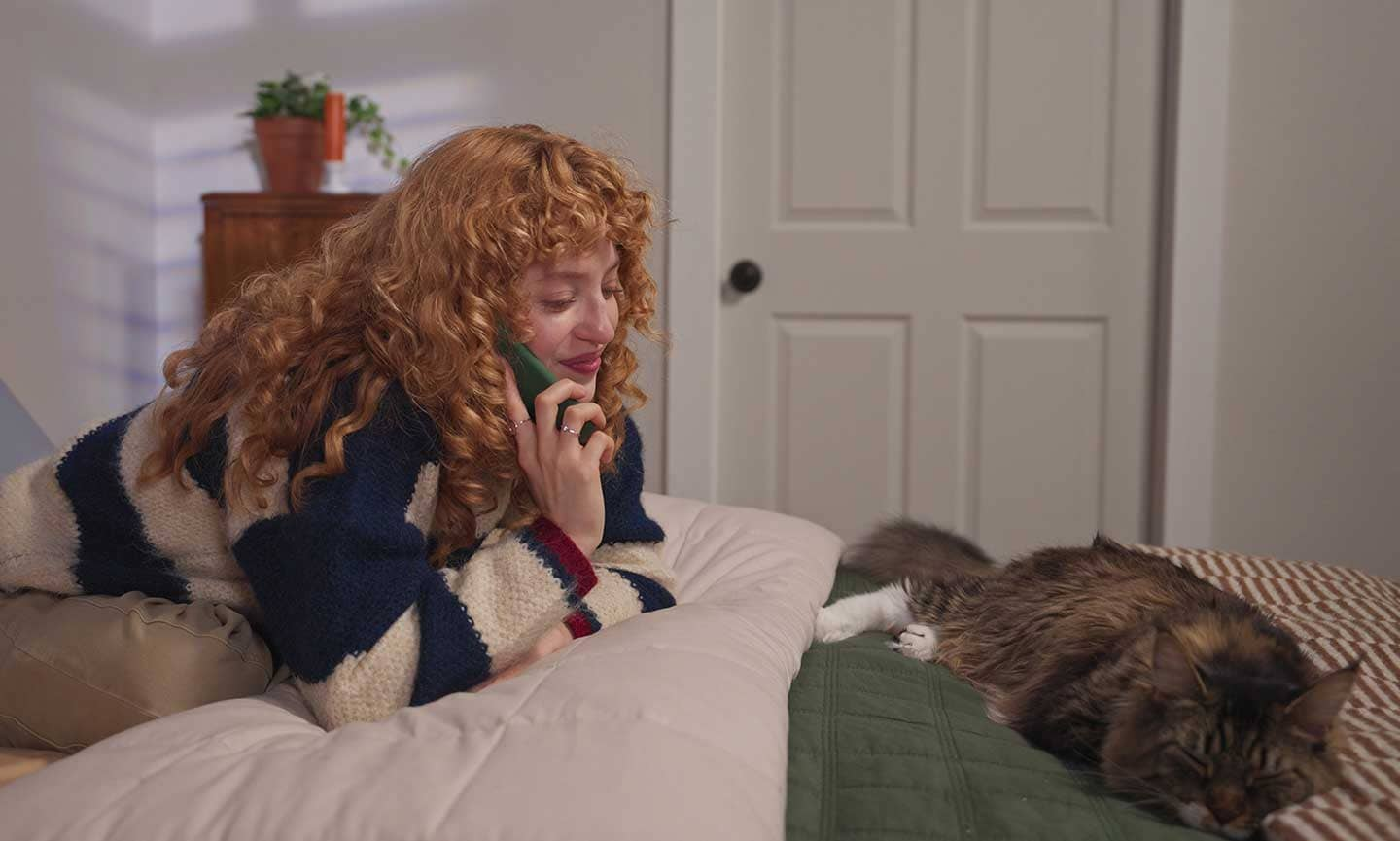
Cats dealing with urinary tract diseases, such as UTIs, cystitis, or bladder stones, may start spraying, Dr. Casper says. Age-related medical conditions, particularly cognitive decline, may increase or trigger this cat behavior as well.
See your veterinarian for a physical exam if your cat is scent-marking. They will likely run blood tests and check your cat’s urine to look for any underlying medical causes.
3 Address Anxiety and Stressors

Stress is another common reason cats spray. “Changes such as a new pet or a new family member in the household; a move to a new location; addition of new furniture; or rearranging of existing furniture can trigger this behavior,” Dr. Casper says.
Ways to alleviate some of this stress:
- Make sure the litter box is clean and there’s one for each cat, plus an extra, each placed in different locations around your home.
- Provide your cat with enrichment items, like scratching posts, cat trees, and toys.
- Try soothing products, like diffusers that emit synthetic pheromones (Feliway® is a trusted option).
- Medication prescribed by your veterinarian.
How To Remove Cat Spray Smell
To get rid of that offensive cat spray smell, clean the soiled area as soon as you notice it with an enzymatic cleaner, such as Nature's Miracle® Cat Stain Remover & Odor Eliminator. These enzyme-based cleaners neutralize the scent and minimize the chances of your indoor cat coming back to the area to spray again.
“[Cat spray] contains several sulfur-containing amino acids, including one called felinine, which is unique to small cats,” Dr. Anderson says. “These compounds themselves don't smell, but the breakdown products are highly pungent and increase as the urine sits. Microbes carried along with the urine likely also contribute [to the odor].”
Using a black light can help identify areas you might have missed.
FAQs About Cat Spraying
Q:Do female cats spray?
A:Female cats spray, particularly when they are in heat or receptive to mating. Some may also spray as a way to mark territory or because they’re feeling anxious. This is most common in unspayed cats, but spayed female cats may also spray due to an underlying behavioral issue, medical issue, or stress.
Q:Can neutered or spayed cats spray?
A:Yes. According to a study by Cooper and Hart in 1992, 10% of neutered males spray and 5% of spayed females spray. Dr. Casper says that if a neutered or spayed cat starts spraying, it is likely due to an underlying behavioral issue. There’s also a possibility that not all the reproductive organs were removed during the spay/neuter procedure, which means the pet is still producing hormones that trigger spraying behavior.
If you’ve tried some of the advice above and it’s not helping your cat spraying situation, enlist help from a veterinarian and/or cat behaviorist. They can help pinpoint the issue, and find you and your furball some relief. Also make sure you’ve noted the difference between cat spraying (on vertical surfaces) and failing to use the litter box for regular elimination.
Share:



